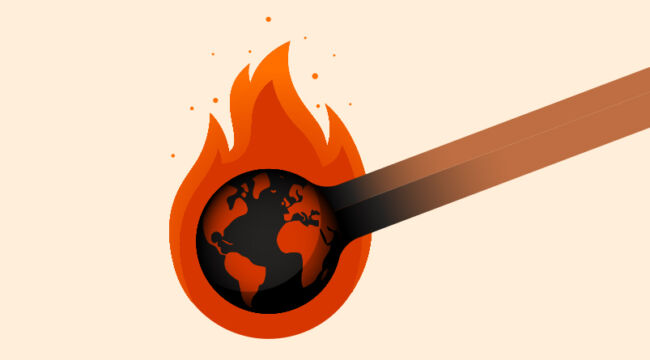The Year Global Warming Ends
“There’s no question I’m in favor of banning fracking” — Kamala Harris, 2019.
“I will not ban fracking” — Kamala Harris, 2024.
Would she? Wouldn’t she? We do not know.
Yet the lady has consecrated herself to the pursuit of “net zero.” That is, to net zero carbon emissions by 2050. La Harris:
We set an ambitious goal to cut our greenhouse gas emissions in half by 2030 and to reach net-zero emissions by 2050.
All at a mere cost of… $275 trillion!
Yet let us assume an even more ambitious carbon dioxide ban. Let us assume all carbon emissions ceased immediately.
All gasoline-powered vehicles are banished to the scrap heap this day, all airplanes to the boneyard, all coal and natural gas locked away.
When will Earth begin to break its fever? When would Earth begin cooling from present temperatures?
Here are your choices:
A) 6 months
B) 2½ years
C) 21 years
D) 99 years
E) 213 years
F) 476 years
Answer shortly. Let us first consider net zero’s carbon nirvana.
To attain net zero’s cool ambitions, non-carbon energy must supply 98–100% of all electricity by 2050.
Furthermore, says the World Resources Institute, net zero demands that we:
Phase out coal power generation six times faster — equivalent to retiring 940 average-sized, coal-fired power units per year.
Improve the energy intensity of building operations five times faster for commercial buildings and seven times faster for residential buildings.
Lower the amount of carbon dioxide emitted per tonne of cement produced over 10 times faster.
Expand public transportation systems, including metros, light-rail trains and bus rapid-transit networks, across the world’s highest-emitting cities six times faster.
Reduce the annual rate of deforestation 2.5 times faster — equivalent to avoiding deforestation across an area roughly equivalent to all arable land in Switzerland each year.
Shift to healthier, more sustainable diets five times faster by lowering per capita consumption of ruminant meat to the equivalent of two burgers per week across Europe, the Americas and Oceania.
Global carbon emissions must reduce by over 5% each year.
“Five percent is piddling,” you say, “that doesn’t strike me as much.”
Just so. Yet emissions dipped merely 4–8% during the mass economic lockdowns of the pandemic.
Are you prepared for 26 years of similar privation?
If you are relatively sane, you realize net zero stands zero chance of fruition. It lives merely in the fevered dreams of its architects.
Let us nonetheless return to our question. And once again we assume an even greater ambition than the zealots.
If all carbon emissions ceased this very day… when would Earth begin cooling from present temperatures?
Here again are your choices:
A) 6 months
B) 2½ years
C) 21 years
D) 99 years
E) 213 years
F) 476 years
Have you selected your answer?
The correct answer is F — 476 years.
Here Nature magazine cites projections by a climate model named ESCIMO:
ESCIMO is a “reduced complexity Earth system” climate model which we run from 1850 to 2500. In ESCIMO the global temperature keeps rising to 2500 and beyond, irrespective of how fast humanity cuts the emissions of man-made greenhouse gas (GHG) emissions… the global temperature keeps rising for hundreds of years…
The forecast relies of course on a climate model. Yet our scientific advisers claim its wizardry is sound.
Many men of science agree. Reduced carbon emissions will not reduce Earth’s temperature for centuries — if not millennia.
That is chiefly because carbon dioxide likes to linger within Earth’s atmosphere.
Reports the Royal Society:
Even if emissions of greenhouse gasses were to suddenly stop, Earth’s surface temperature would require thousands of years to cool and return to the level in the pre-industrial era.
Meantime, Princeton’s crackerjacks inform us that:
Even if carbon dioxide emissions came to a sudden halt, the carbon dioxide already in Earth’s atmosphere could continue to warm our planet for hundreds of years.
We must reduce carbon emissions “for the children,” we are told.
Yet we must apparently do it for the great-great-great-great-great-great-great-great grandchildren.
“But Maher,” shrieks Chicken Little, “you don’t get it.”
“The best case is that Earth will begin to cool in centuries. That’s assuming that we stop all emissions now. If we don’t drastically reduce carbon emissions soon, we’ll soon reach a tipping point that’ll result in nunaway warming. We have to act now.”
Yet we have withered beneath these howls for decades. Doomsday will happen by such-and-such date if we don’t stop immediately.
We did not stop immediately. And doomsday passed — invariably — without incident.
We have every reason to believe the next doomsday will pass without incident. And the one after that and the one after that one.
Yet Chicken Little will be forecasting doomsdays — we hazard — for the next 476 years.



Comments: